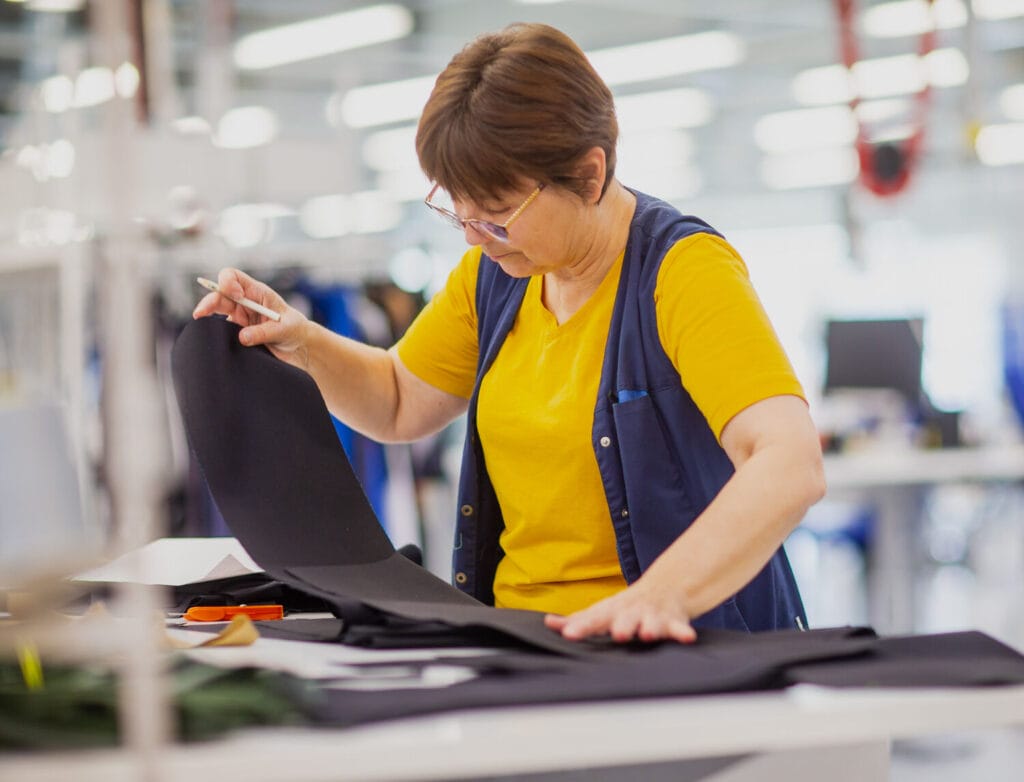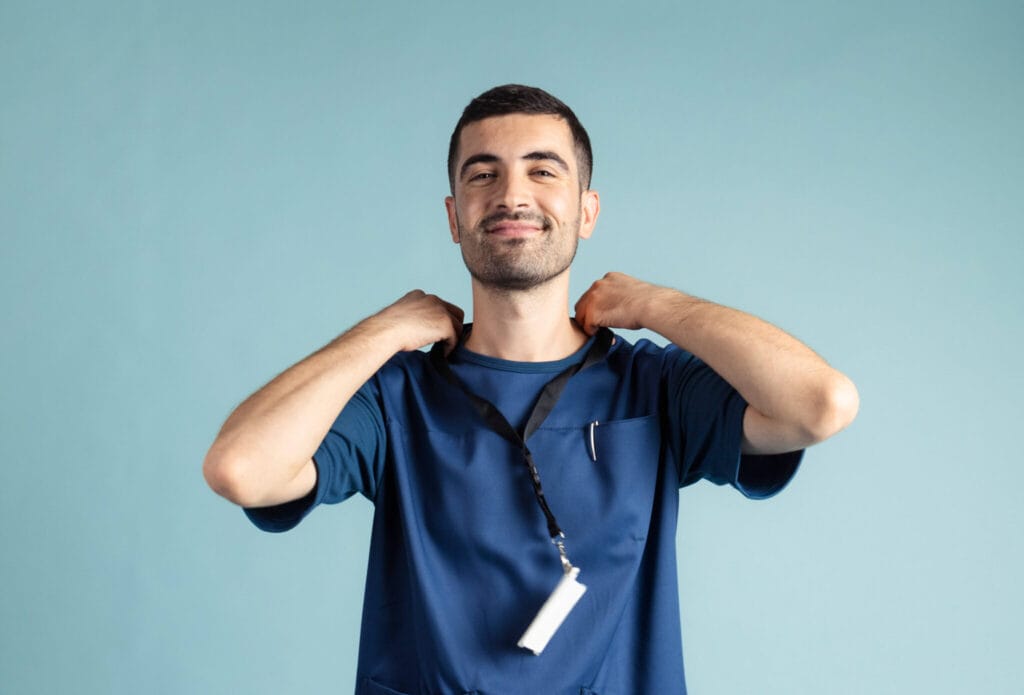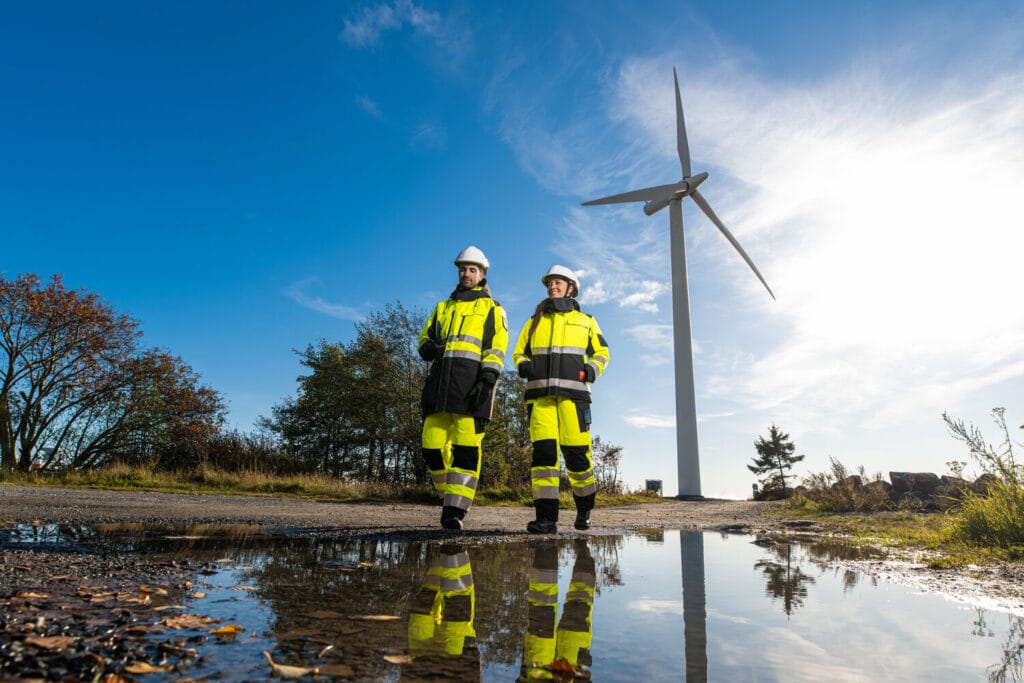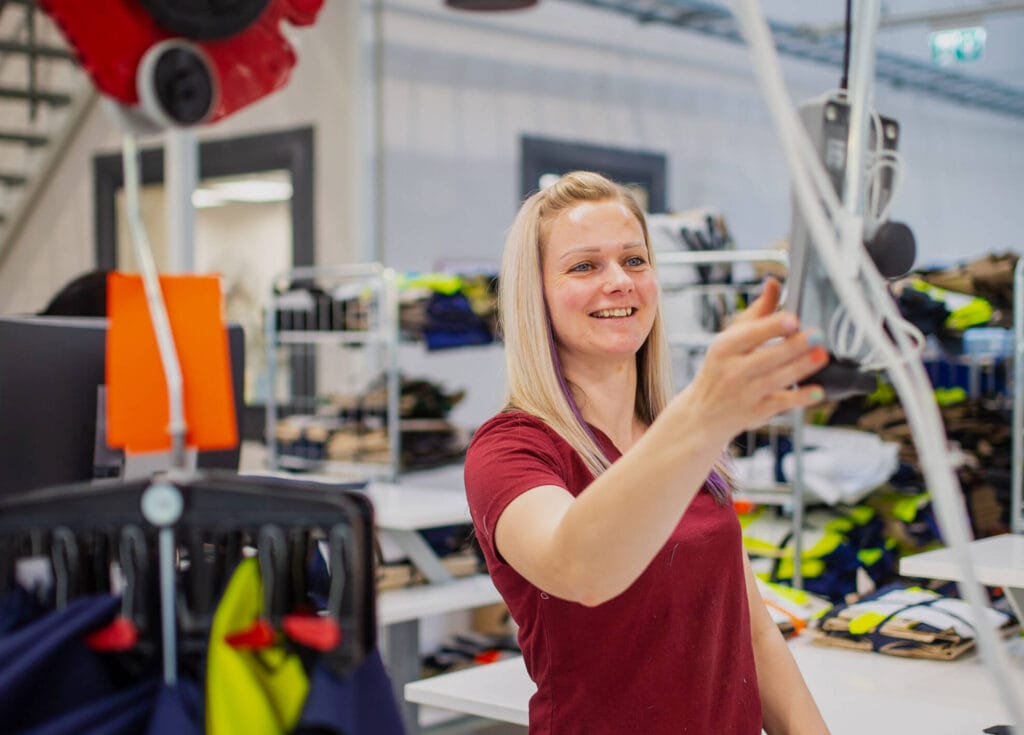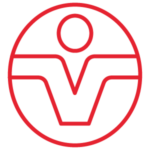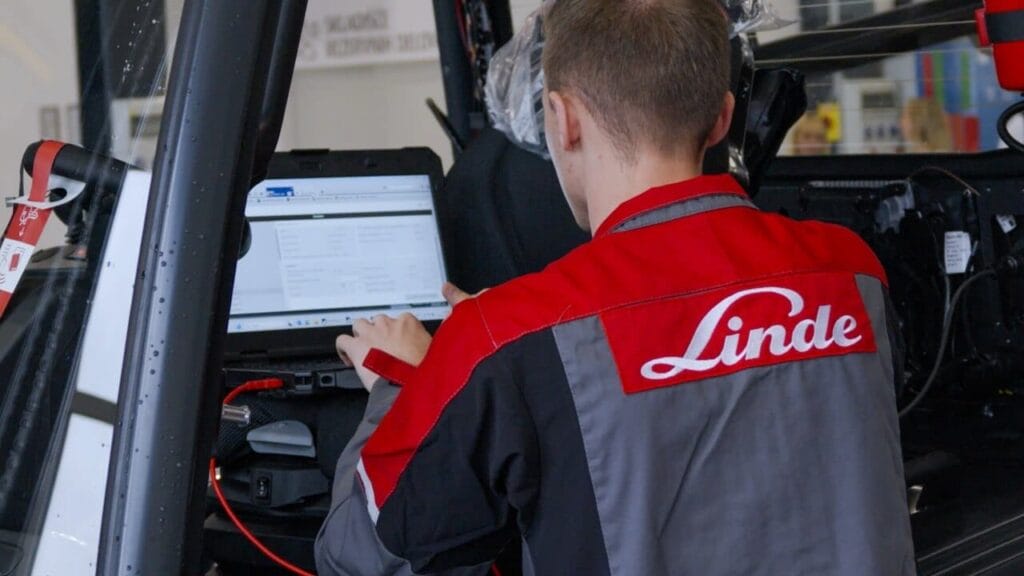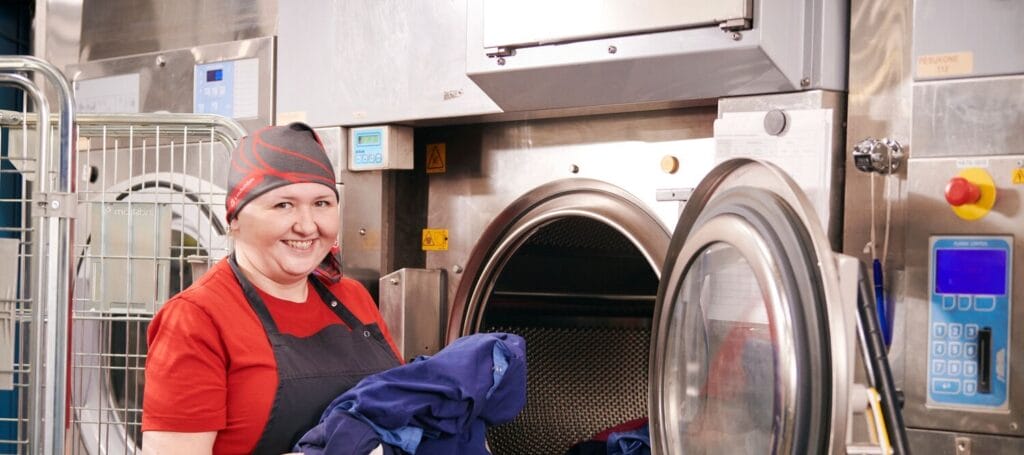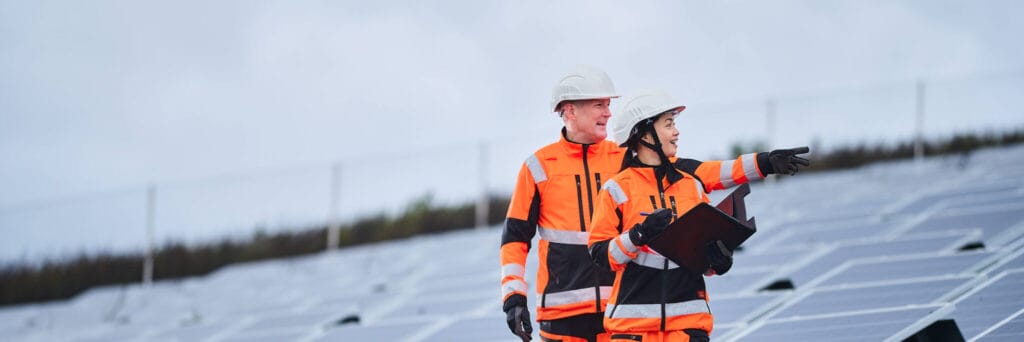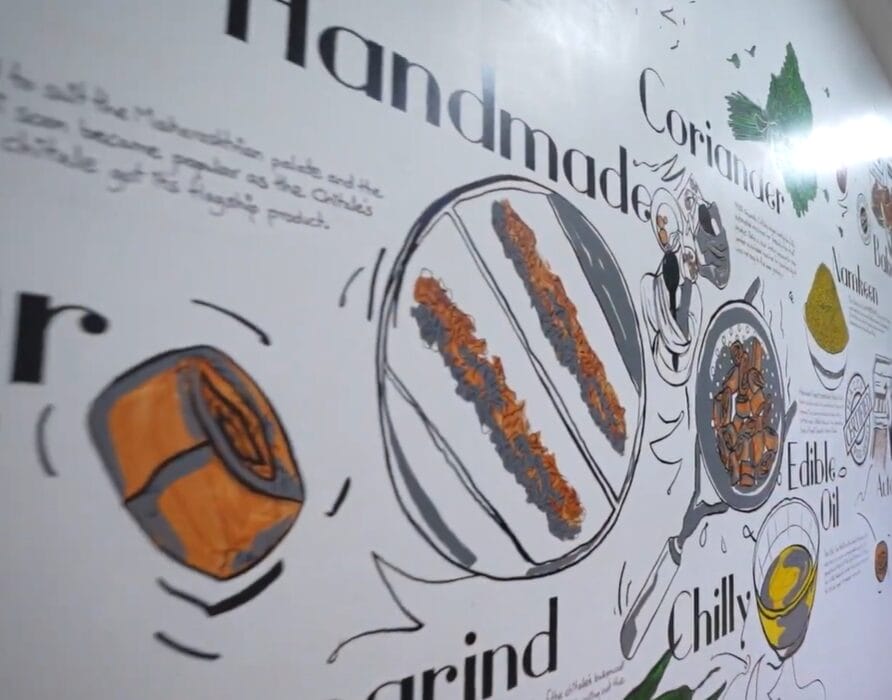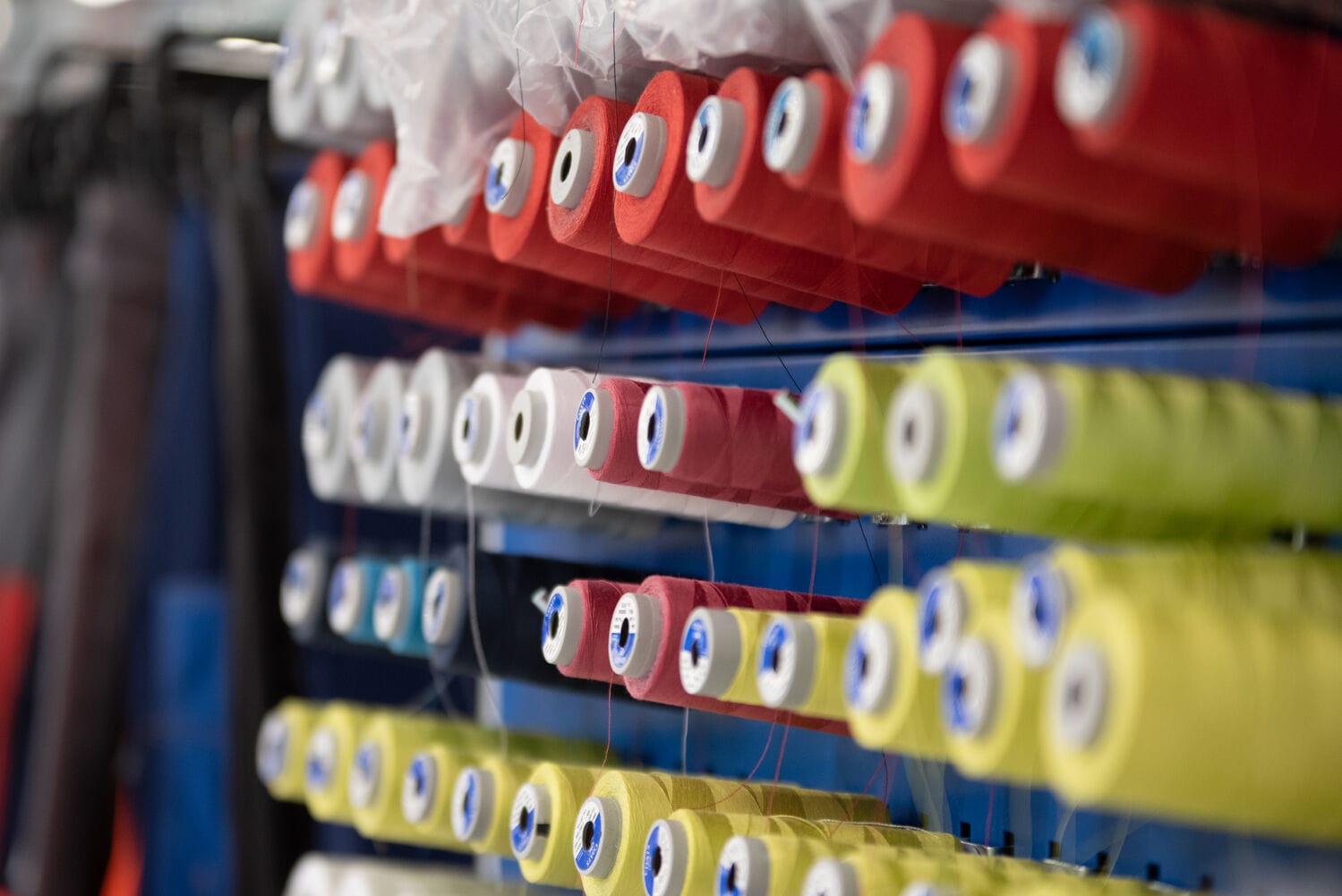
The PRODEM production model: Fast, flexible, and 100% renewable
We’ve reached a major milestone on our journey to net-zero emissions by 2050: All our PRODEM garment factories now run on 100% renewable energy. Plus, we’re recycling or repurposing every scrap of textile waste with our recycling partners.
In this article, we’ll go behind the scenes of our production model—what it is, how it works, and why it’s a win-win for customers and the climate.
What is PRODEM?
PRODEM (short for PROduction on DEMand) is our on-demand production model that gives you high-quality workwear exactly when you need it—no more, no less.
Unlike traditional mass manufacturing that uses a “push” system based on forecasts, PRODEM only starts production when there’s confirmed customer demand. This “pull” system reduces waste, lead times, and unnecessary stock.
In the past, our textile manufacturing often relied on mass production. meaning large quantities, often in the same size and colour, with minimal changeovers. But as times changed, so did market demands, and we had to come up with a new approach.
Zsolt Keresztes, Managing Director of PRODEM Hungary
Built on lean principles inspired by the Toyota Production System, PRODEM improves efficiency while reducing our environmental footprint. In 2024, our average manufacturing lead time for replacement and additional orders was just 1–3 days, with a total lead time of 5–7 days.
“Our factory is quite a unique place,” says Gusts Dzenis, Managing Director of PRODEM Latvia. “We specialise in the rapid production of small-scale orders, catering to tight timelines with exceptional efficiency. Normally in garment manufacturing, you have lead times of 40 to 60, or even 100 days, and order sizes in hundreds and even thousands at the same time.”
PRODEM at a glance:
In use at Lindström since 2017 (Latvia, followed by PRODEM India opening in 2018, and Hungary in 2019)
400+ employees across Latvia, Hungary, and India factories
Average order quantity: 4.6 pieces per order (2024)
715.320 produced pieces (2024)
Delivery in 5-7 days total (2024)
The path to 100% renewable energy
Going fully renewable didn’t happen overnight. The journey started years ago as part of our broader sustainability strategy.
Keresztes explains, “From my very first day here, it was clear there was a strong commitment to sustainability. We have a dedicated sustainability team, and every business unit is expected to align with that vision.”
In 2017, we opened our first PRODEM factory in Latvia, expanded to India the following year, and brought the concept to Hungary in 2019—where we retrofitted an existing facility and trained the team on the PRODEM way.
To prioritise sustainability, we started by choosing machines with the lowest energy consumption and eliminated all wasted energy in our processes. 25% of our renewable energy in Hungary now comes from on-site solar panels, and the rest from certified green energy.
We’ve also tackled the challenge of sustainable waste management. Instead of energy-intensive baling, we use large reusable bags—cutting both emissions and cleaning costs. And all cutting waste is recycled through our partners Texool Refashion in India and SK-Tex in Slovakia.
“Textile recycling has been one of our biggest challenges—even more difficult than switching to green electricity,” says Keresztes. “The complexity comes from the wide range of textile materials we use, including mixed compositions and chemical treatments like fire resistance or water repellence. We wanted partners who were open about their processes and willing to accept an audit from us. This is how we ended up with these two partners.”
PRODEM benefits for customers
Quick turnaround time
Our short lead times mean you can place urgent or last-minute orders without the usual wait. Keresztes explains: “In a traditional supply chain, you always have to plan around seasonality—what you order today might take three months to arrive. But in reality, it often takes up to a year to reach your warehouse.
With our workwear production model, you can get what you need in just a few weeks, or even a few days if it’s urgent. We’re able to react to very fast-changing and specific customer demands.
Zsolt Keresztes, Managing Director of PRODEM Hungary
Competitive pricing
Lean operations help us keep costs down—even with higher labour costs in Europe. “Many companies in textile manufacturing couldn’t adapt to today’s market needs. With PRODEM, we’ve created something unique that adds real value—enough to offset the higher production costs in Europe compared to low-labor-cost countries,” says Keresztes.
You also avoid the hidden costs and emissions of unnecessary shipping and storage. Keresztes adds: “We’ve cut stock levels dramatically by producing based on actual demand. When nothing sits on shelves waiting to be sold, you can avoid scrapping garments—and the waste that comes with it.”
Sustainable by design
PRODEM supports your environmental goals—not just through renewable energy and textile recycling, but also by waste reduction. We prioritise repairing garments and replace only when needed, extending their lifespan and lowering the overall environmental impact.
“Our business model itself is a big advantage for customers in terms of sustainability because we’re not just selling garments but providing workwear service. If a worker’s garment is damaged, we first try to repair it rather than throwing it away and selling a new one,” says Keresztes.
Better employee experience
Happier teams make better products. Our PRODEM model creates an engaging, safe, and rewarding environment for the people making your workwear. Instead of repetitive mass production, PRODEM lets Lindströmers build new skills, switch between tasks, and earn performance-based pay—all while working in a clean, secure setting.
The team here that makes one garment consists of eight people. This means everyone has to know many operations and often shift from one product to another. Their work is not monotonous.
Gusts Dzenis, Managing Director of PRODEM Latvia
PRODEM 2.0 and beyond
Reaching 100% renewable energy is a milestone, not the finish line. We’re always exploring new ways to improve, from smarter textile recycling to integrating robotics, 3D printing, and AI into our processes.
PRODEM is also expanding: We’re developing PRODEM 2.0—an updated version of our production model designed to meet fast-evolving customer needs.
“Without our experienced people, we couldn’t have built such a successful production unit,” says Keresztes. “I hope this model will thrive in many new locations, bringing faster, smarter service to customers around the world.”
Key takeaways:
| 100% renewable energy | All PRODEM factories now run entirely on green energy, with on‑site solar in Hungary. |
| Zero textile waste | Every fabric scrap is recycled or repurposed through trusted partners. |
| On‑demand production | Garments are made only when ordered, cutting waste, storage, and lead times (just 5–7 days). |
| Competitive & sustainable | Lean operations keep pricing fair while supporting customers’ climate goals. |
| Better for people | Skilled, engaged teams work in safer, more varied roles, boosting quality and morale. |


